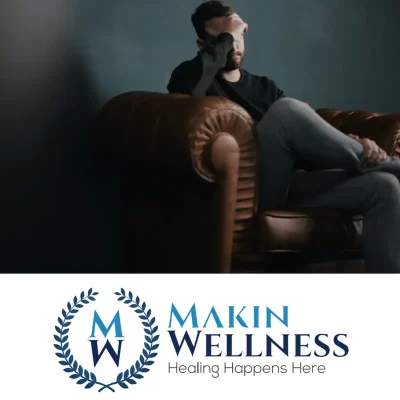Anxiety has a way of affecting the body and mind. It sends our thoughts into spirals of worry that may never even come true. Our body tells us there is trouble as our heart rate quickens, palms sweat, and it gets hard to breathe, sometimes in the absence of threat. Further, nervous thoughts race through our minds hindering focus and sleep. These common symptoms of anxiety are extremely uncomfortable and can interfere with our daily lives.
Anxious thoughts can stem from many different areas of life, such as stress faced at home, school, or work; worries about finances, relationships, or illness; or traumatic experiences we have been through in the past, in combination with our genetic makeup. It can manifest itself in many different forms. Among the most common are panic attacks, specific phobias, obsessions, compulsions, and social and generalized anxiety disorders. These types each have unique criteria, and their symptoms can affect your mental state, physical body, and cognitive abilities.
In the Moment:
When encountering symptoms of anxiety, it is important to treat yourself with acceptance and kindness. Understand that your anxiety is not something to be ashamed of but something to work through. Try to meet your racing thoughts with reason and reassurance. Sometimes, we have a habit of being too harsh with ourselves, so it helps to remember to talk to yourself as you would talk to a friend.Pittsburgh Anxiety Therapy
You can pair these changes in mindset with deep, controlled breathing exercises to calm down your physical symptoms. This technique is effective because slowing down your breathing calls on the parasympathetic nervous system, which has the job of “undoing” the fight-or-flight response we often feel in the face of stressful situations.Anxiety
When to Get Help:
If your anxiety is intense, persistent, or enduring, or if it regularly causes you distress or hinders your day-to-day activities, reach out to a counselor for support. During your time with them, they can help you recognize the situations that trigger your anxiety and come up with skills and techniques you can use to remedy your symptoms whenever they may occur.
Different Forms of Therapy and Treatment:
Bear in mind that today’s therapy takes on many different forms. You can take part in group sessions, individual therapy, and even e-therapies via phone calls, emails, and text messages, thanks to advances in technology, so assess your own needs and preferences when deciding which route to take.
One of the most common and effective methods of treatment, cognitive behavioral therapy (CBT), allows people to maintain control and self-confidence in their practice. CBT operates on the assumption that people react not to the situations they are in but their perceptions of those situations, so it works to adjust the often-automatic negative thoughts that pop up when we’re in stressful situations, thus leading to positive changes in how we feel. According to the Anxiety and Depression Association of America (ADAA), most people who are treated with cognitive behavioral therapy see progress in 12 to 16 weeks, though this varies by individual.
Conversely, behavior therapy focuses on changing your behaviors in order to produce changes in thought processes. A natural way that people approach anxiety is to avoid the situations that trigger it, but the problem with this is that it reinforces the fear you feel and limits your chance of overcoming it. Exposure therapy is a behavioral method used by therapists to help clients overcome anxiety through facing their fears. In a practice called systematic desensitization, you can confront your fears in gradual stages while learning relaxation techniques to lessen your physical response to them. This has been found most effective in people dealing with specific phobias and obsessive-compulsive disorder.
Group psychotherapy has also been very effective in reducing symptoms of anxiety. People dealing with the same types of feelings can come together and offer one another support and suggestions under the supervision of a therapist. Benefits include destigmatizing and normalizing the way you feel and providing a platform for sharing experiences and techniques.
In conclusion, anxiety can sometimes feel overpowering as it takes a toll on you physically and emotionally, but there are many diverse ways to treat and overcome it. Use compassion as you deal with your symptoms and remind yourself that over 40 million adults in the United States are facing anxiety disorders too, and you are in no way alone (adaa.org).
If you are feeling overwhelmed due to symptoms of anxiety, please schedule a free consultation now to get connected with Pittsburgh’s best therapists!
—
About Makin Wellness :
Founded in 2017 , Makin Wellness is Pittsburgh’s premier therapy and coaching centers located in Downtown , Pittsburgh and New Kensington, PA. The company’s mission is to help people heal and become happy again. Makin Wellness specializes in depression, anxiety, addiction and relationship counseling .

Sara Makin
MSEd, LPC, NCC








